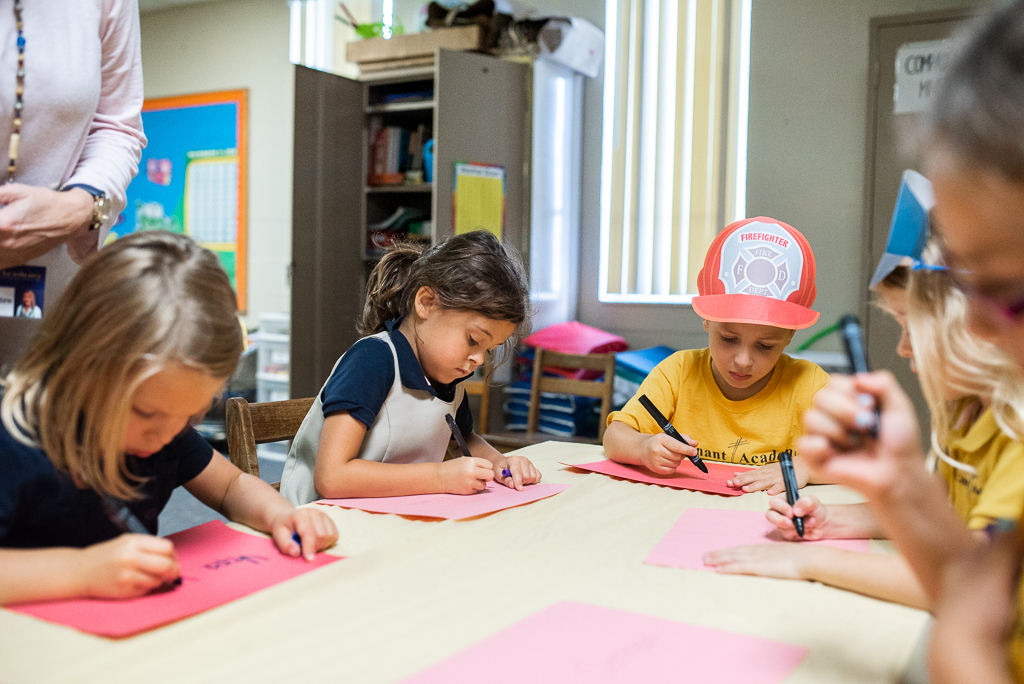How to Assess Kindergarten Readiness
Kindergarten comes quickly! The first day of Kindergarten is filled with excitement and emotion as we launch our little ones off to start formal schooling. One of the greatest measures of success for the kindergarten year is your child’s academic and social-emotional readiness. Now is a good time to assess areas of strength and areas still being developed in your child. As the parent, you have the privilege to come alongside your child and help build their skills, confidence and security. What a fun and important job. Let’s get started:
In determining readiness for kindergarten, parents should consider five things: general knowledge, vocabulary, attentiveness and focus, curiosity and desire to learn, and social and physical maturity. While these skills are further developed in kindergarten, a certain level is needed for a successful first year of formal education.
General knowledge

General knowledge is gained through read aloud books, exploring, and engaging children in conversation about the world around them. A child ready for kindergarten should know basic colors and shapes, show reading readiness by demonstrating print awareness, phonemic awareness and be able to recognize most letters of the alphabet. Some children may know the sounds of several letters. They should also recognize numbers to ten, be able to count to 20, recognize and create patterns, and understand ordinal numbers.
Vocabulary
A child’s vocabulary entering kindergarten has been shown to determine academic success. Vocabulary is acquired through read aloud and discussion with an adult. Engaging conversation and learning activities such as cooking, creating art projects, visiting the library, and exploring together will help to increase vocabulary. During these activities, taking time to explain new words, processes, and materials will expand a child's general knowledge and vocabulary.
Attentiveness and Focus
The ability to focus on instruction or a task is important for successful learning in the classroom. Readiness for kindergarten means the child can follow instruction and stick with a task for five to ten minutes. Electronic devices are not a good choice for increasing focus needed in the classroom. Hands-on or listening activities are best. Read aloud practices, listening to audio books or project learning are effective ways to increase attentiveness. Building blocks and puzzles are also good activities to develop this skill.
Curiosity and Desire to Learn

A curious mind is easy to teach. Young children are like sponges, soaking up new information minute by minute. Exposing them to a variety of experiences helps their curiosity to grow. Explore the outdoors, visit farms and outdoor events, involve them in household chores and projects, go strawberry picking (or whatever is available in your area), include them in your hobbies, let them get their hands dirty, create and build, and engage in sports.
Social and Physical Maturity
Social and physical maturity is seen in the child’s ability to take turns, share with others, listen, communicate, have command of their body, hold a pencil, write their name, and use scissors. Kindergarten is a place for learning social skills and further developing physical maturity.
This is not an exhaustive list of skills for kindergarten, but it will help you assess and prepare for this important step in your child’s life. It is not expected that these skills be mastered. Some children will know all their letters and sounds─maybe even be reading when they enter kindergarten, while others will have a reasonable grasp of these skills. Both will be successful with your encouragement.
You might find a school like Covenant Academy in your area that does kindergarten screenings in the late spring or summer. This screening provides an informal, individualized assessment of your child’s current readiness skills and how you can best support them in preparation for the fall.

